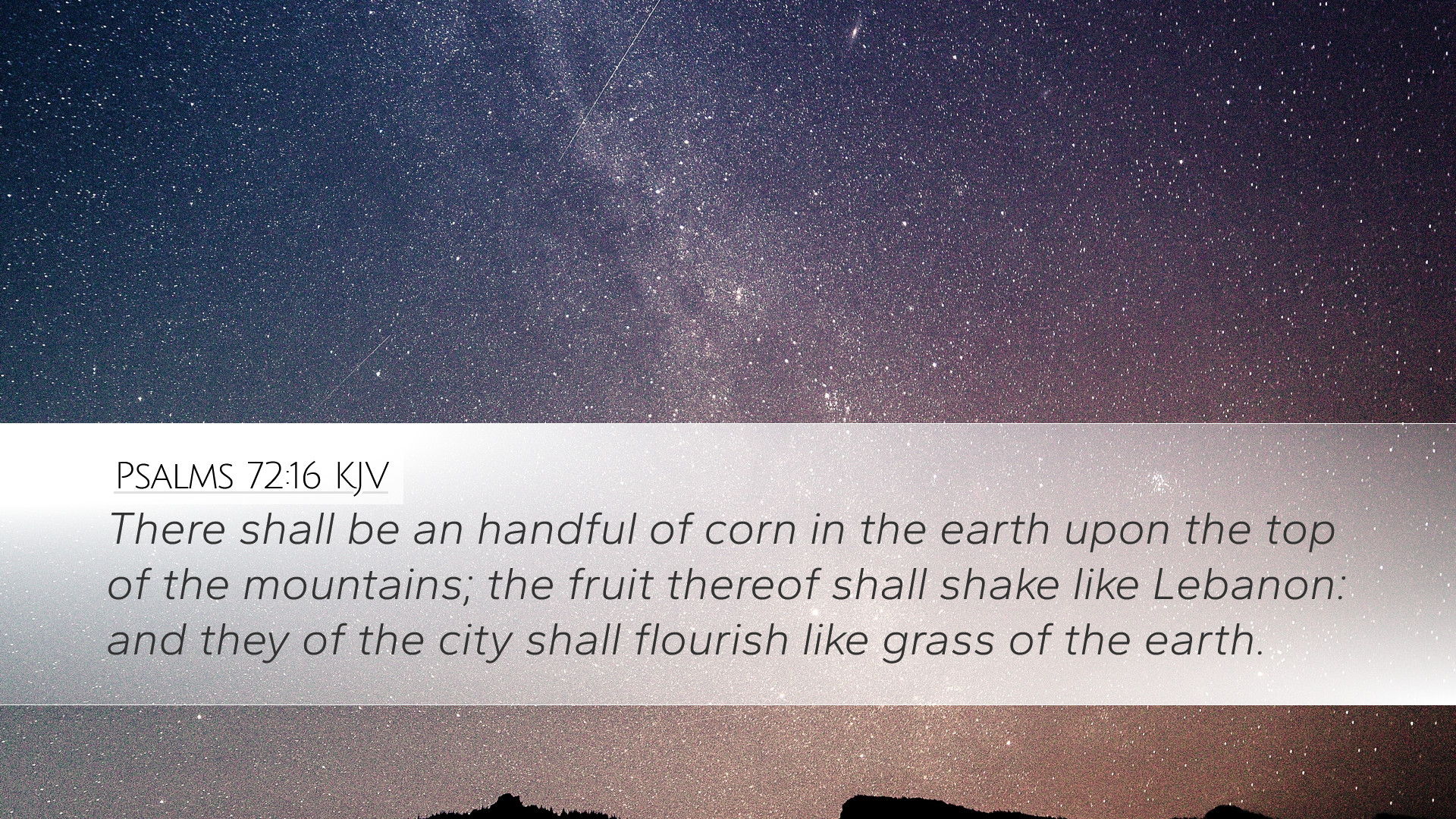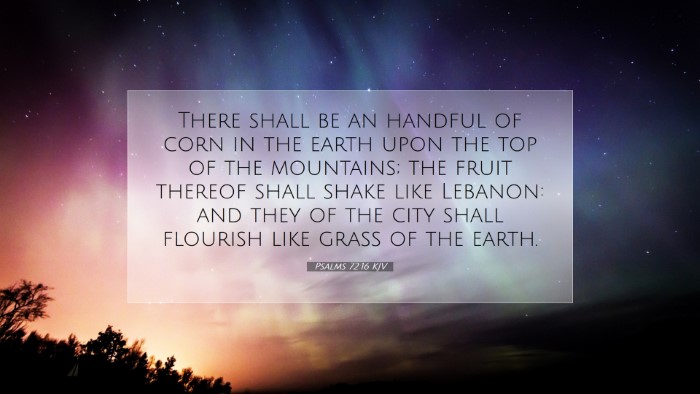Psalms 72:16 Commentary
Verse Context: Psalms 72:16 states, "There shall be a handful of corn in the earth upon the top of the mountains; the fruit thereof shall shake like Lebanon: and they of the city shall flourish like grass of the earth." This verse is part of a royal psalm attributed to Solomon, emphasizing the ideal reign of a righteous king.
Overview and Significance
This psalm is often read as a messianic prophecy and an expression of the ideal king's reign, representing prosperity, justice, and peace. Solomon is considered a type of Christ, and thus the psalm extends its relevance to the broader scope of biblical prophecy, culminating in the reign of Jesus Christ.
Interpretations from Matthew Henry
Matthew Henry notes the significance of the phrase "handful of corn," emphasizing the miraculous bounty that will occur even in barren and high places like the mountains. He draws attention to the agricultural metaphors, suggesting that the blessings of God will be evident in an abundant harvest. This symbolizes spiritual prosperity and abundant life under the righteous reign.
- Spiritual Fertility: Henry emphasizes that spiritual fruitfulness is akin to the physical abundance described. Just as corn can thrive in unexpected places, so too can God's blessings manifest in the lives of believers.
- Descriptor of the King: The ideal king, Solomon, is portrayed as a leader whose reign promotes agricultural and societal flourishing, suggesting a correlation between righteous leadership and communal well-being.
Insights from Albert Barnes
Albert Barnes provides a detailed analysis of the imagery utilized in this verse. He remarks that the "handful of corn" signifies wealth and prosperity, likely pointing to the blessings that God showers upon His people through their leader. Barnes illustrates that the abundance mentioned can be understood both literally and metaphorically:...
- Divine Blessings: Barnes interprets the imagery of shaking fruit as indicative of the shaking and movement of people being blessed by God. The flourishing of the people is a reflection of the divine hand at work in their midst.
- Comparative Flourishing: The comparison of the city flourishing to the "grass of the earth" suggests growth, vitality, and continual renewal, reminding believers of the importance of living in accordance with God’s commands to maintain such flourishing.
Analysis from Adam Clarke
Adam Clarke takes a linguistic approach to the text, examining the Hebrew terms and their implications. He comments on the cultural significance of agricultural symbols in ancient Israelite society, where grain was a vital part of sustenance and prosperity.
- Symbolism of Corn: Clarke highlights that the "handful of corn" on the mountains can likewise illustrate the idea of abundance arising from seemingly inadequate means, reflecting God's miraculous provision.
- Mountains as Places of Encounter: Mountains in the Bible often symbolize places of divine encounters. Thus, corn thriving on the mountaintops is akin to God's presence and favor being established among His people, leading to widespread blessing.
Theological Themes
Across the mentioned commentaries, several theological themes emerge from Psalms 72:16:
- Righteous Leadership: Effective and just governance plays a crucial role in the flourishing of society. The verse illustrates that a king's righteousness leads to national blessings.
- Faith and Provision: The depiction of abundance serves as a reminder of God’s faithfulness—a theme prevalent throughout scripture, where divine provision is often linked with trust and obedience.
- Messianic Fulfillment: This psalm carries eschatological implications, looking forward to the reign of Christ who provides spiritual sustenance and nourishment to His followers, thereby illustrating a deeper fulfillment in the New Testament context.
Application for Believers
For pastors, scholars, and believers, this verse encourages reflection on the nature of God's blessings and the role of leadership. The understanding that spiritual flourishing can occur in unexpected ways invites believers to trust in God's providence irrespective of circumstances.
- Leadership and Integrity: Reflect on the qualities of leadership that align with biblical principles, and how such leadership can impact communities positively.
- Embrace Spiritual Growth: Just as physical provisions are depicted, believers are called to seek spiritual nourishment and growth, fostering environments conducive to health and revitalization.
Conclusion
Psalms 72:16 serves as a powerful reminder that under righteous guidance and divine providence, abundance and flourishing are not only possible but promised. By studying the insights from Matthew Henry, Albert Barnes, and Adam Clarke, we gain a multidisciplinary view that enriches our understanding and application of this text in everyday life.


